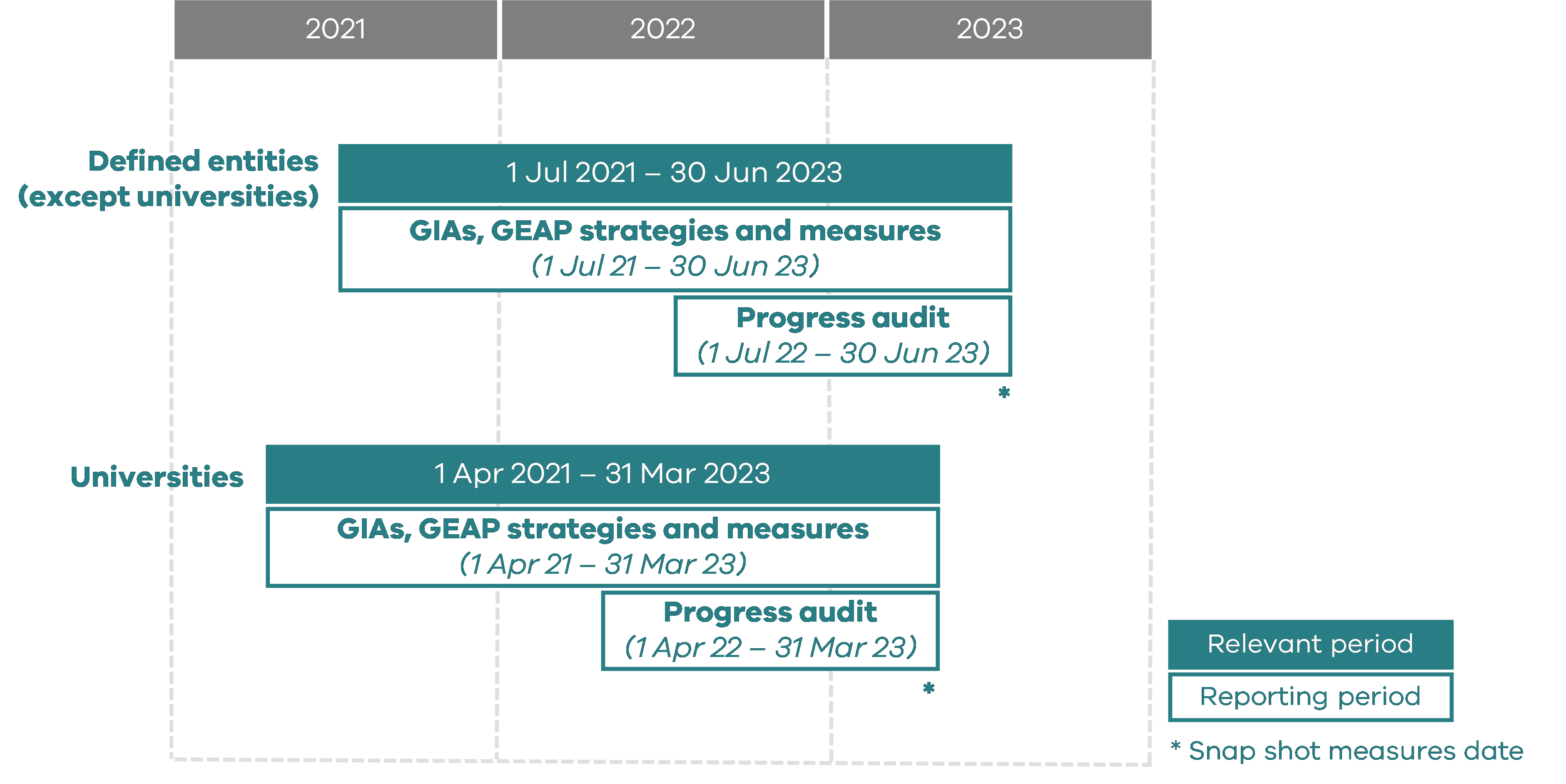The Gender Equality Act 2020 (the Act) requires defined entities to submit a progress report to the Public Sector Gender Equality Commissioner in every second year after submitting a GEAP. The first progress report is due on 20 February 2024.
Progress reports must address the following 4 elements outlined in section 19 of the Act:
- Gender impact assessments (GIA): report on the policies, programs and services that were subject to a GIA and the outcomes of those GIAs.
- Gender Equality Action Plan (GEAP): report your organisation’s progress in relation to the strategies and measures listed in their GEAP.
- Workplace gender equality indicators: demonstrate your organisation’s progress in relation to the workplace gender equality indicators.
- Gender equality targets and quotas: demonstrate your organisation’s progress towards meeting any prescribed gender equality targets or quotas. Please note there are currently no prescribed gender equality targets or quotas in place, so you are not required to report on this in the current round of progress reporting. Guidelines to report on progress against targets and quotas will be published if they are prescribed by regulation.
Conducting a progress audit will help you to understand and demonstrate where you have made progress in relation to the workplace gender equality indicators (item 3 from the list above).
A progress audit is defined as:
- Collecting updated information in relation to the workplace gender equality indicators.
- Comparing the updated information to the information submitted in 2021 as part of your workplace gender audit.
This guidance sets out how to conduct a progress audit, and the data measures to include in your organisation’s progress audit. The guidance should be read with:
- the workforce reporting template
- the employee experience reporting template
- the progress reporting guidelines
- the progress reporting template.
The workforce reporting and employee experience templates are located on the progress audit page.
The progress reporting guidance and template can be found on the progress reporting page.
Tip: definitions and instructions for this progress audit guidance are included in Appendix B.
Overview of your progress audit
Under section 19 of the Act, a defined entity must submit a progress report to the Commissioner every second year after submitting a Gender Equality Action Plan (GEAP). In the progress report, a defined entity must (among other things) demonstrate progress in relation to the workplace gender equality indicators (described below). The progress audit is used to help you do this.
You must plan to review the information you collected as part of the 2021 workplace gender audit, compare it with the information you collect as part of your 2023 progress audit described in this guidance, and submit the results of this comparison in your progress report.
Progress report guidance can be found on our website.
Workplace Gender Equality Indicators
As defined under section 3 of the Act, workplace gender equality indicators means:
- gender composition of all levels of the workforce
- gender composition of governing bodies
- equal remuneration for work of equal or comparable value across all levels of the workforce, irrespective of gender
- sexual harassment in the workplace
- recruitment and promotion practices in the workplace
- availability and utilisation of terms, conditions and practices relating to family violence leave, flexible working arrangements and working arrangements supporting workers with family or caring responsibilities
- gendered segregation within the workplace.
There are no other prescribed workplace gender equality indicators for 2023 progress reporting.
The relevant period for reporting
The relevant period for the 2023 progress report is 1 July 2021 to 30 June 2023 (or 1 April 2021 to 31 March 2023 for universities).
Different components of a progress report may have different reporting periods that fall within the relevant period. The reporting period for a progress audit is 1 July 2022 to 30 June 2023 (or 1 April 2022 to 31 March 2023 for universities).
The Commissioner acknowledges that entities received an extension on the submission of their first GEAP, which has shortened the period for implementing GEAP strategies and measures ahead of reporting on progress. As such, the change your organisation has been able to achieve in the relevant period may be impacted.
Privacy and confidentiality
It is important to maintain the privacy and confidentiality of your workforce throughout the progress audit process.
The Commission’s responsibilities
We are required to comply with the Information Privacy Principles (IPPs) in the Privacy and Data Protection Act 2014 (Vic) (PDP Act). The IPPs regulate the way personal information is handled, from collection to use and disclosure, security, accessibility and disposal.
We are also required to comply with the Health Records Act 2001 (Vic) (HR Act) when we collect and handle health information. When dealing with a systemic gender equality dispute under the Act, the Commission is also required to comply with the secrecy provisions at clause 46-46A of the Act. We collect, hold, use and disclose personal information to:
- undertake our functions under the Act
- help to resolve gender inequality disputes that arise under the Act
- communicate updates to defined entities and the general public
- perform research and data analysis to achieve our functions under the Act
- promote ourselves and our functions
- obtain products and services for our organisation.
We may also collect, hold, use and disclose personal information for other purposes explained at the time of collection or for purposes:
- which are required or authorised by or under law or
- for which you have provided your consent.
Information provided through progress audit results will be de-identified (employees’ names and personal identifiers such as employee numbers are not included). However, depending on the size of the defined entity, it may still be possible for people with access to this information to ascertain an individual’s identity based on all the information that is collected. If this is the case, this means we may collect sensitive information and personal information about employees.
We will remove any personal information from progress audit results and Gender Equality Action Plans before they are further distributed or published, in accordance with the Act.
For further information on our privacy policy including why and how we collect information, who we may share personal information with, data quality and security, and other matters, please view the privacy policy on our website.
Your organisation's responsibilities
Your organisation is responsible for your own compliance with relevant privacy obligations, including under the PDP Act and HR Act, which requires you to collect, use, and disclose personal and health information in accordance with the IPPs and Health Privacy Principles (HPPs).
It is recommended that you seek and refer to your own organisation’s guidance around privacy, confidentiality, and data protection to ensure that you maintain the privacy and confidentiality of your workforce and that you are compliant with relevant laws and regulations.
Visit the Office of the Victorian Information Commissioner (OVIC) website for further privacy considerations for your organisation to comply with your obligations under the Act.
Other Victorian and Commonwealth laws
When conducting a progress audit, your organisation must have regard to your legal obligations under relevant Commonwealth and state legislation and industrial instruments, including but not limited to:
- The Fair Work Act 2009 (Cth) and other Commonwealth workplace relations legislation
- The Equal Opportunity Act 2010 (Vic) and the Charter of Human Rights and Responsibilities Act 2006 (Vic)
- The Sex Discrimination Act 1984 (Cth) and the Workplace Gender Equality Act 2012 (Cth)
- enterprise agreements, workplace determinations and modern awards.
Updated


